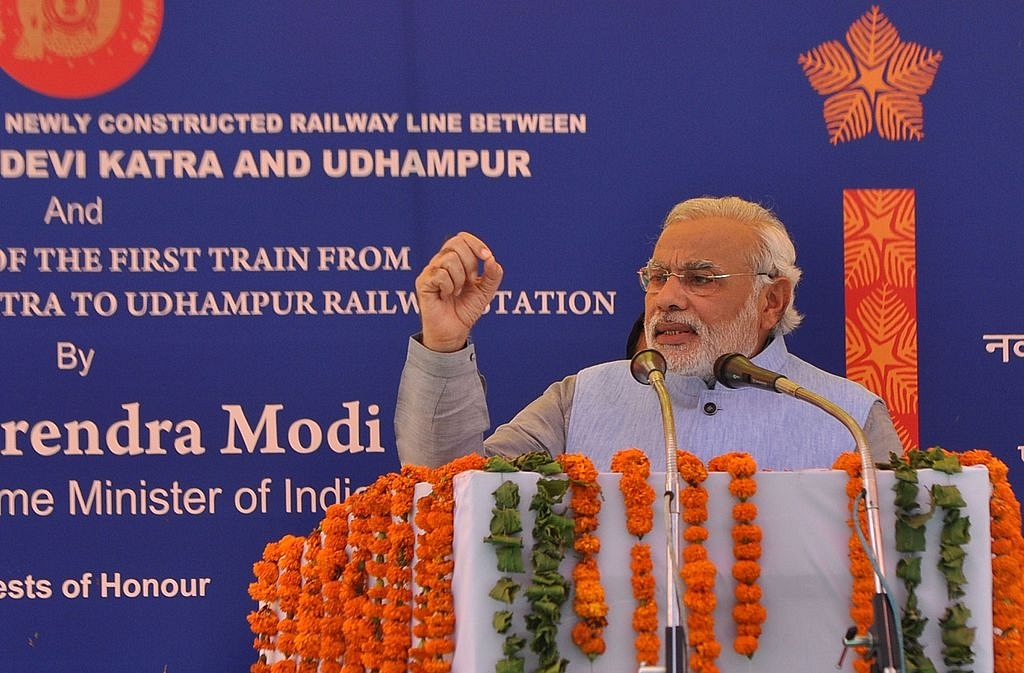Politics
Why Modi Government Should Grant J&K Citizenship Rights To Hindu And Sikh Refugees
- The refugees, who have long suffered government apathy, rest their hopes on Narendra Modi Government to provide them with citizenship rights of Jammu and Kashmir.

Prime Minister Narendra Modi speaks during the inauguration ceremony at Katra railway station, 45 km from Jammu. Photo credit: STR/AFP/GettyImages
Indian academic and writer Madhu Purnima Kishwar discussed many issues in her comprehensive essay on Jammu and Kashmir (J&K), titled ‘Of Article 370, Plebiscite & Hindu Refugees of POJ&K Flogging Dead Horses And Ignoring Live Issues’ (13 September). I will ignore all and focus on one: citizenship rights for the Hindu refugees from Pakistan-Occupied Jammu and Kashmir (POJ&K). There is a specific reason for that.
As far as the refugees from POJ&K were concerned, they included not only the Hindus but also the Sikhs. The Hindus straightaway migrated to Jammu. The Sikhs from Muzaffarabad, the capital of the so-called Azad Kashmir, did try to migrate to Kashmir province – of which they were the residents – but the National Conference and its leader Sheikh Mohammed Abdullah, who had the full backing of the then Indian prime minister Jawaharlal Nehru, didn’t allow Sikhs to settle anywhere in the Valley. They also migrated to Jammu. Most of them made Jammu and Kathua districts their new abodes.
It needs to be underlined that the refugees from POJ&K were citizens of Jammu and Kashmir when they migrated from their original habitat to Jammu and they have been exercising, as “permanent residents” of the state, all the rights which are available to all the “permanent residents” of the state. They are both citizens of India and citizens of Jammu and Kashmir. Yes, they have been protesting at regular intervals against the Jammu and Kashmir government and the Government of India, but not for obtaining “citizenship rights”. They have been struggling to get compensation for the properties they left behind in 1947-1948. They, like all other “permanent residents” of Jammu and Kashmir, enjoy the right to have immovable property, right to job under the state government, right to higher education, right to bank loan and so on. Besides, they take part in the Lok Sabha, Assembly and local-body elections, like all other “permanent residents” of the state.
Similar is the political status of the hounded out Kashmiri Hindus. They enjoy all the rights. Leave aside the fact that the Jammu and Kashmir Government makes unjust, invidious and humiliating distinctions between the refugees from POJ&K – Kashmiri Hindus and Kashmiri Muslims – and accord preferential and differential treatment to the latter.
These hapless and abandoned refugees have held numerous demonstrations in Jammu and Delhi, organised long marches, courted arrest and exhausted all constitutional methods of agitation to obtain citizenship rights. Faced with official apathy, they even approached the Supreme Court in 1982, but failed to obtain justice because Jammu and Kashmir enjoyed special status under Article 370 of the Indian Constitution. Disposing of the Writ Petition (Civil) No. 7698 of 1982 on February 20, 1987, the Supreme Court said it was “unable to give any relief to the petitioner”.
The operative part of the judgement reads:
Though the Supreme Court did not give any relief to the petitioner, it did suggest ways and means of redressing the grievances of the refugees, but with no result. Neither the State nor the Union Government thought it advisable to act on the suggestions as contained in the judgement for obvious reasons, the most important being the oft-repeated argument of Kashmiri leadership that granting citizenship rights to the refugees would mean a change in the state’s demographic profile, erosion of its autonomous status and alienation of Kashmiri Muslims from India. Expectedly, the Union Government sided with the Kashmiri leadership overlooking the human angle. That attitude persists even today.
It may appear unbelievable, but it is a fact that the Sheikh Abdullah-led Government in the state granted citizenship rights to numerous Uyghur Muslim families in 1952 and settled them in the Eidgah area of Srinagar with full citizenship rights. The Uyghur Muslims migrated from Xinjiang province of China to escape Communist Beijing’s wrath.
It is hoped the Government of Prime Minister Narendra Modi would undo the past wrongs and grant citizenship rights to the refugee from West Pakistan. The 2014 BJP Vision Document for Jammu and Kashmir unambiguously says that the BJP, if voted to power in the state, shall grant all citizenship rights to them.
Introducing ElectionsHQ + 50 Ground Reports Project
The 2024 elections might seem easy to guess, but there are some important questions that shouldn't be missed.
Do freebies still sway voters? Do people prioritise infrastructure when voting? How will Punjab vote?
The answers to these questions provide great insights into where we, as a country, are headed in the years to come.
Swarajya is starting a project with an aim to do 50 solid ground stories and a smart commentary service on WhatsApp, a one-of-a-kind. We'd love your support during this election season.
Click below to contribute.
Latest